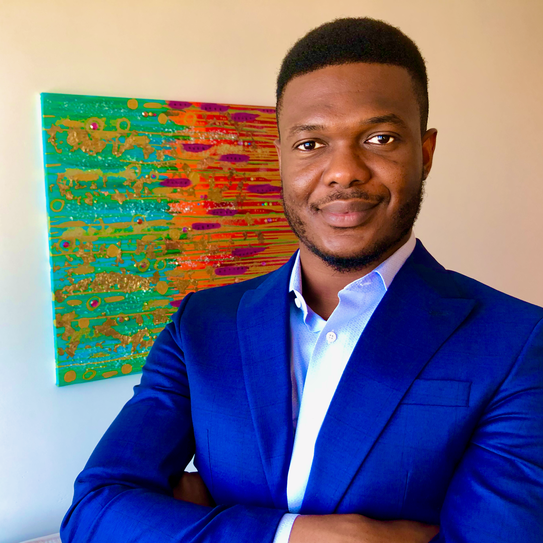Efosa Uwaifo

CBS Activities or Clubs:
Student Government Chair for Diversity Equity & Inclusion (2022)
Cluster C Chair for Diversity Equity & Inclusion (2021)
Assistant Vice President for Green Business Club, Energy & Infrastructure Club, Africa Business Club (2021)
Three Cairns Climate Fellow (2021)
Above & Beyond Award for promoting respect, integrity, and belonging in the Columbia Business School community (2021)
Prior to starting, what were you expecting the program to be like? How was it different than your expectations?
I expected it to be a leadership incubator and an opportunity for learning across diverse fields, but the COVID-19 pandemic made me hesitant to set expectations. Although our first year was mostly remote, the learning was still as impactful, and I also got to build deep friendships with my classmates and strong mentorships with faculty and alumni. Most importantly, I am grateful that Columbia Business School has given me the opportunities to work on my passions, helped me improve my leadership toolkit to effectively solve problems that I am passionate about. I also value the access to individuals and organizations with similar passions as me.
Why did you choose Columbia Business School?
I knew I wanted to pivot my career into renewable energy from traditional oil and gas, and because Columbia Business School was paying increasing attention to this area, this attracted me. We have a Climate Change and Business track within the MBA program and a new Climate School within the University. Also, climate change is one of Dean Costis Maglaras’ priority areas for Columbia Business School. And then you can’t discount the appeal of living in the coolest city in the world.
What do you think is your most valuable or differentiating contribution to your class?
I feel very humbled to be surrounded by highly talented, brilliant, and accomplished young people. It’s clear that the amazing work the Admissions team did assembling such a group. Our complementary strengths and collaborative ethos have made working together in class, clubs, case competitions, and cultural groups easy and effective. In these situations, I’ve observed that my optimism and thoughtfulness have helped me galvanize my teams to achieve our targets.
Which faculty member(s) influenced you the most, and how?
Modupe Akinola, Daniel Ames, Omar Besbes, Todd Jick, Sandra Metz, Medini Singh, and Dan Wang. They are all accomplished and amazing teachers that invest in getting to know their students, support them, and create an environment of respect and inclusivity in the classroom.
What clubs are you involved in and what are your goals? What are your DEI (Diversity, Equity, and Inclusion) goals after graduation?
I currently serve on the Student Government Board where I lead DEI efforts within the community. Our three focus areas this year are:
- Denouncing biases, discrimination, and hate
- Educating students about our local community and the cultural backgrounds of their peers
- Integrating the fragmented communities on campus.
I’ll be taking these experiences with me to become a champion for DEI in the workplace, upon graduation.
What has been your most memorable experience at Columbia Business School so far?
Rather than a day or an event, it’s been the people in my cluster (C’22). It’s an amazing group and they will always be my family. For example, I started the first eight weeks of the MBA program remotely overseas because of the COVID travel restrictions, but I didn’t feel disconnected at all because of the amazing support and inclusion system we had in the group. During that time there was civil unrest in my city, and I had so many of my classmates and faculty members reach out to offer their support. It was very heartwarming. If I had to pick a favorite cluster event, it would be our CBS Matters.
What was the most challenging part of the program, and how did you handle it?
The 2020/21 academic year was super challenging not only because of the pandemic and travel restrictions but also the major social and political issues that happened around us – the landmark cases of police brutality and discrimination against people of color, anti-Asian violence, and the political transition in the U.S. A lot of credit should go to the School and University leadership for galvanizing unity and togetherness within the community during this period. Within my cluster we created safe spaces for honest conversations about these issues and organized a Harlem and Chinatown walk to raise money for Black and Asian charities.
What advice would you give to a new student coming into the MBA program at Columbia Business School?
Define what your priorities are before you start. Our MBA program can take you in so many directions – you can learn new things, deepen your expertise, build a network of mentors, (our Executives in Residence program is amazing), volunteer on campus and with organizations, experience the city, make friends, work, start a company, etc. Rather than get overwhelmed with the offerings, identify what success means to you and prioritize that.
What does the new Manhattanville campus mean to you?
My class is very fortunate to experience the School in-person and remotely, in the old and new campuses – all within two years. I like Uris Hall, but I think the new campus is an opportunity for a rebirth of the student experience and the culture within the community. I’m excited to be part of the people who get to shape that for the generations to come.